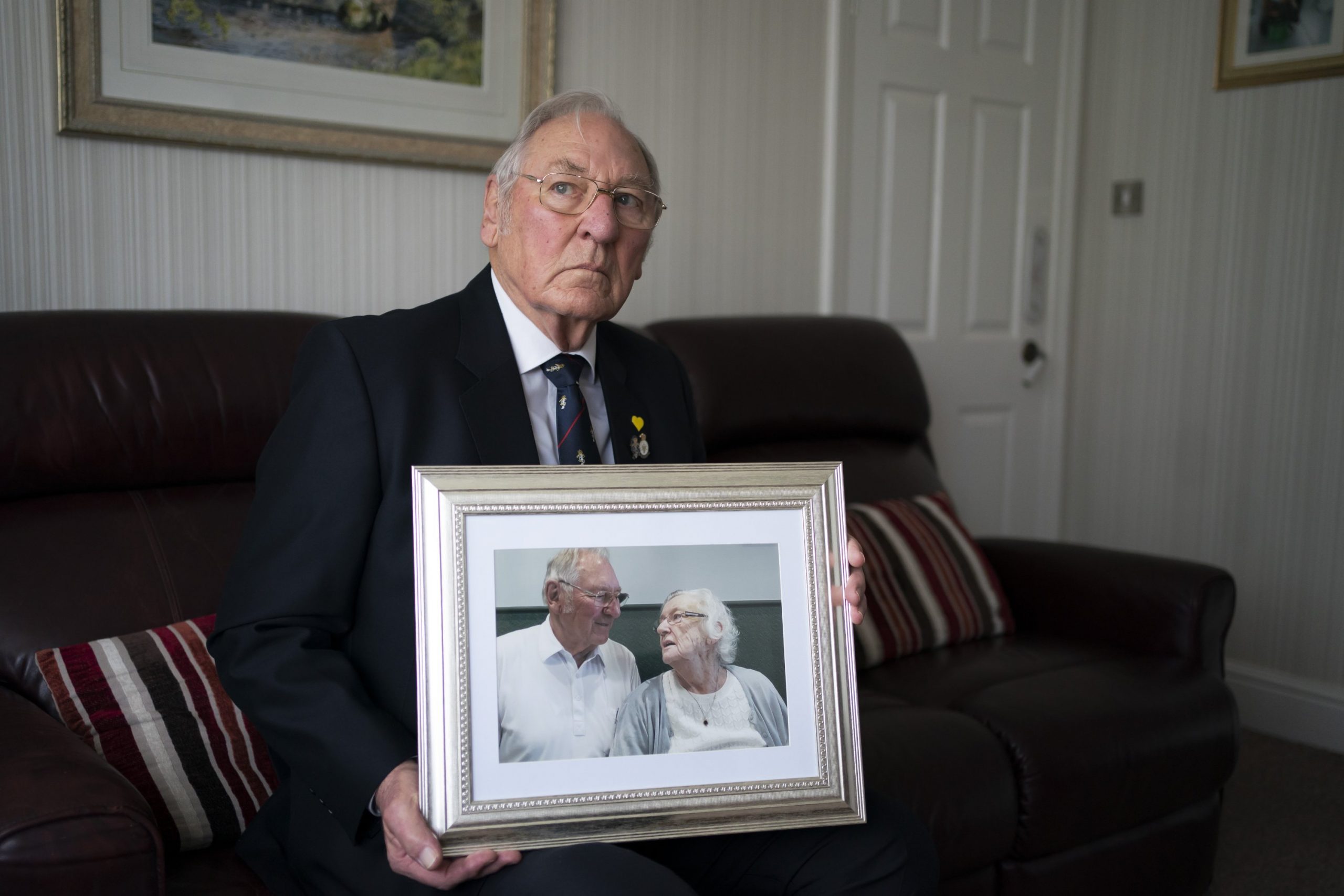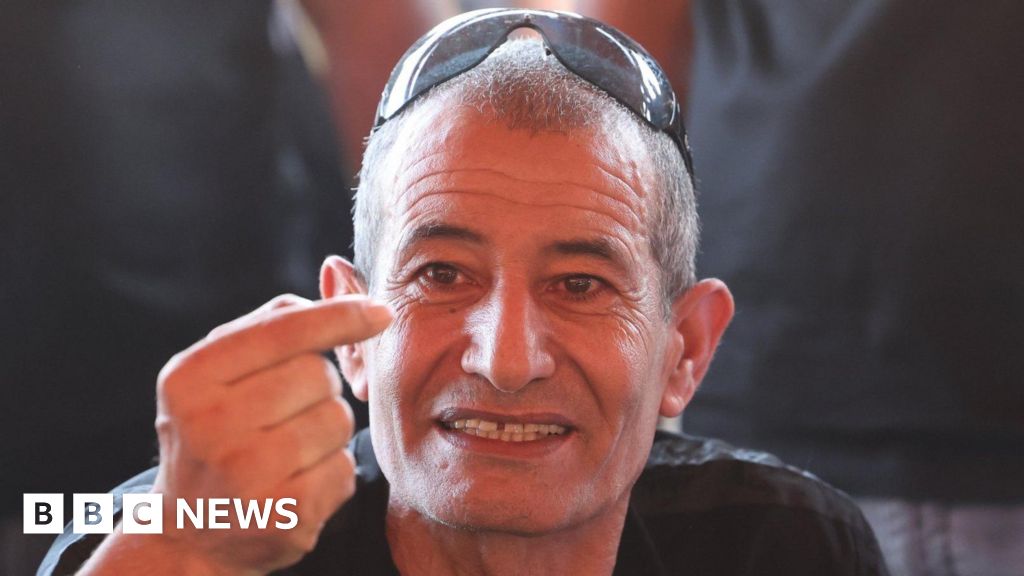London (AFP) – Nine months ago, Gordon Boehner was in “the outbacks of despair and desolation” after losing his 63-year-old wife to the coronavirus pandemic that killed more than 100,000 people in the UK.
Only recently did Bonner think he might be able to move on – after sensing his wife Muriel’s soul, close to him on her 84th birthday.
“I suddenly realized that I must change my attitude, that memories are not shackles, they are garlands and one must wear them like garlands around your shoulders and use them to communicate between the fastest and the dead,” an interview from his home in the northern city of Leeds, the retired major said in a statement. “Grief is the price we pay for love.”
Bonner, 86, is just one of hundreds of thousands of Britons toil with grief over the pandemic. With more than two million people dying worldwide, people around the world are grieving loved ones, but the toll in the UK is having a particularly big impact: it is the smallest country to cross the 100,000 mark.
While Wuhan, Bergamo or New York City may be more closely related to the epidemic, the UK has one of the highest death rates for its residents. For comparison, the United States, which has a population five times that of Britain, has four times the number of deaths. Experts say virus numbers are, in general, underestimated due to limited testing and missed cases, especially early in the pandemic.
Along with the excess deaths comes excessive grief, which is exacerbated by the social distancing measures in place to slow the spread of the virus.
“There will be a tsunami of grief and mental health problems this year, next year, going on, due to complications, because of course people have not been able to practice their usual rituals,” said Linda Magistris, founder. Good melancholy confidence, Which brings the bereavement services of the UK together under one umbrella.
Bonner understands the need for limitations but that hasn’t made it easier.
Six weeks after he was banned from going to a Morel nursing home due to lockdown restrictions and 10 days after she was diagnosed with COVID-19, Bonner was called to the hospital and “dressed as an astronaut,” and testified against his last wife. Painful moments.
“She was working hard to breathe,” he said, “her lips were chased as if she was sucking a straw.” “I can see her face now with her lips in this position and it was devastating and dropping me sideways.”
That was the last time he saw Morell, and this photo is haunting him. In what he called a “sinister twist in the story,” Bonner was not offered the opportunity to replace that memory because his wife’s body was considered a “reservoir for the active Coronavirus.” He wasn’t even able to wear it the way he wanted to cremate her. Cuddling with Friends and Family – Well, they are not recommended.
These rituals are helping people cope, a task that is now becoming more difficult because the UK’s death toll – well above the annual average of around 600,000 – is inevitable – from regular sirens to disturbing headlines on newscasts.
Andy Langford, clinical director, said, “The background to death and the grief around it creates a totally piquant context.” Cruz, Which is a pioneering charity for bereaved people.
Many of those left behind are not sure where to seek help, partly because they are navigating the grieving process at a time when local health services are not operating normally.
Bereavement charities have stepped in, designing online support groups, which may attract those who may have been reluctant to seek help in the pre-COVID-19 world.
But resources are draining, especially when the country regularly records more than 1,000 deaths a day. The government is being urged to provide additional funding to strengthen helplines, counseling services, and other community support programs.
“It’s really important that we don’t see sadness as an indicator of mental health difficulties,” said Dr. Charlie Baker, associate professor of mental health at the University of Nottingham. “But a large number of people will need support.”
Many will not require any external support or just minimal. But there is concern that some grief is pent-up: People may be subconsciously protecting themselves from its full effect, and they may end up taking a heavy hit as the epidemic is brought under control.
“I think it’d be a weird thing because it’d be a really positive thing when we hope things get back to some degree of normality, but I think this would also be a very difficult moment because we were all freezing up a little in time,” said Joe Goodman, who lost her adult father, Stuart. He was 72 years old in April, just days after he was infected with the virus.
Two months after her father’s death, Goodman, 32, co-founded the COVID-19 Bereaved Families for Justice group to lobby the government to support a public inquiry into how the pandemic was handled last spring.
“We cannot normalize the fact that hundreds and hundreds of people die every day knowing what their families are going through,” Goodman said.
Prime Minister Boris Johnson said an investigation would take place – but only after the crisis is over. But critics already argue that the government has repeated mistakes it made in the spring in the current boom, Like shutting down the country too late. The UK is also grappling with a new, more infectious species that may carry a higher risk of death than the original strain.
Meanwhile, Boehner hopes the country will take the time to grieve properly and consider sending a letter to Johnson, who has yet to support a national memorial for virus victims, to propose a “simultaneous commemoration service that even those of us who have lost people due to the coronavirus can go to …” Somewhere to find some solace. “
___
Follow the AP’s coverage of the pandemic at https://apnews.com/hub/coronavirus-pandemic And https://apnews.com/UnderstandingtheOutbreak.

“Zombių evangelistas. Mąstytojas. Aistringas kūrėjas. Apdovanojimų pelnęs interneto fanatikas. Nepagydomas interneto fanatikas”.





